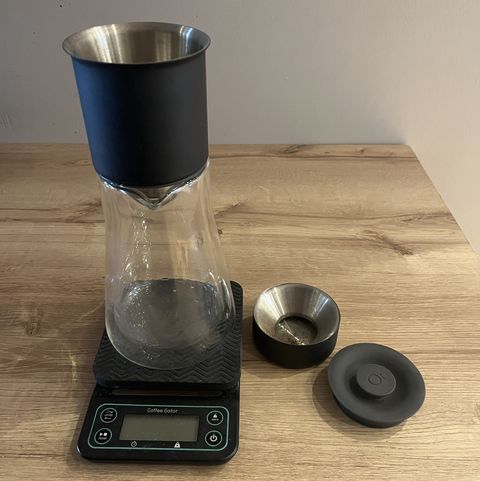There is no one right way to make coffee. Most people opt for the convenience of an automatic drip coffee machine. Others prefer their coffee small in volume and high in concentration, and opt for espresso. A growing number of folks like the one-cup, push-button simplicity offered by pod-based coffee machines. But if we could only choose one method of coffee preparation, it would have to be pour-over coffee. The fact that you’re in total control of your brew, the cathartic nature of the brewing routine and the resultant excellent cup of coffee are all reasons to give pour-over coffee a shot. But in order to brew pour-over coffee, you need a pour-over coffee maker. These are the best.
Additional reporting by Will Price.
What to Look for in a Pour-Over Coffee Maker
Size
Pour-over coffee makers come in many different sizes, from brewers that sit atop a mug and make only a single cup to large brewers that double as carafes and make up to 13 cups at once. Figure out how much coffee you think you’ll be brewing on a regular basis, along with how much room you have in your kitchen for storage or display, and go from there.
Material
Pour-over coffee makers can be ceramic, metal, plastic or glass, with each material offering its own unique properties. Glass, for example, allows you to see what you’re doing and heats quickly, but it also loses heat just as quickly and is prone to breakage. Plastic is lightweight and affordable, but doesn’t exactly lend itself to a premium experience. Metals like stainless steel are super durable but very hot to the touch and poor at retaining heat. Ceramic is excellent at retaining heat but is fragile like glass. Many of our recommended brewers are available in multiple materials, including the Kalita Wave (the stainless steel version is the most popular) and the Hario V60. “I wouldn’t bother with the other varieties, the ceramic holds heat the best,” says Dylan Siemens, 2017 US Brewers Cup champion.
Design
The design of a pour-over coffee maker makes a big difference. Conical designs, like the Chemex, call for more skill to ensure that your coffee doesn’t end up being too watered down. This is good if you know what you’re doing, since it offers you more control over the brewing process, but can be a negative if you’re just starting out. If you pour water onto the sides of the filter and not directly onto the coffee, for instance, it “is basically going to run straight through that filter, onto the glass wall and down to the carafe without ever touching your coffee,” says Edward O’Hickey, who has worked as an educator for esteemed roasters like Toby’s Estate and Partners Coffee. Brewers featuring a flat-bottom design, such as the Kalita Wave, allow for more room for user error since water running down the sides will still hit the grounds.
Filters
Most pour-over coffee makers require a filter, and you’ll need to take them into account when making your decision. Some will work with third-party filters, others will only work with proprietary filters and others — like the Chemex — will work with third-party filters but offer a much better experience with their own thick paper filters. “[The filter] is why I use it the most. It brings a lot of clarity to coffee, and I think it puts a spotlight on some of the flavors that are sometimes harder to pick up,” says Steve Willingham, owner of Oklahoma City’s Clarity Coffee. Proprietary filters can be expensive, and you’ll need to buy them often, so it’s a cost you’ll need to figure into your pour-over budget.
How We Tested
Given that much of our team is picky about coffee and makes pour-over every day, testing for this guide was particularly easy. Our staff already owned the most popular pour-over coffee makers on the market, in some cases for nearly a decade, so we were well-versed in how they work. It then came down to comparing our favorites against each other: what were their strengths when it came to brewing a cup? How forgiving were they when it came to technique? What kind of coffee drinker are they most suited for? Once we were able to answer those questions, we could determine the best pour-over coffee maker on the market.
Kalita Wave
- Size: 185 (2-4 cups), 155 (1-2 cups)
- Material: Stainless steel, glass, ceramic
- Design: Flat-bottom
Unlike other popular pour-over coffee makers, such as the Chemex and Hario V60, the Kalita Wave isn’t cone-shaped. Instead, it boasts a flat bottom with three drain holes, which ensures contact between water and grounds. As a result, it’s more forgiving than other coffee makers and a great option for beginners who haven’t quite mastered proper pour technique — or simply users that don’t have a gooseneck kettle. The flat bottom of the Kalita Wave also produces a stronger cup of coffee than you would expect from a cone-shaped brewer, so steer clear if you prefer a clean cup with a thin mouthfeel.
The stainless-steel construction has its pros and cons. For starters, it’s ultradurable and ultralightweight, making the Wave a great choice for users who plan to take their coffee maker on the road. However, the material is poor at retaining heat, meaning it works best when preheated with hot water before use. — Jack Seemer, Executive Editor
Chemex Classic
- Size: 3-cup, 6-cup, 8-cup, 10-cup
- Material: Glass
- Design: Conical
Before I ever owned a Chemex, I coveted one. As a fan of mid-century modern design, the idea of spending less than 50 bucks to get an original iconic design from 1948 that is part of the permanent collection at MoMA was very appealing to me — the fact that it makes coffee too was almost secondary to me, at least at first. Once I started brewing with it every day, the Chemex suddenly made me care about the coffee I was brewing. It’s a brewer that demands perfection — use quality coffee, grind it to a sea salt-like consistency, pre-soak your Chemex filter, pre-heat the carafe with hot water, bloom your coffee, pour precisely-heated water from your gooseneck kettle in a swirling motion over the grounds … owning a Chemex is not for the faint of heart.
But I find the routine worth it. The Chemex is undeniably beautiful, and when placed on a kitchen counter it essentially announces that you have good taste. I also love the coffee that I’m able to brew with my Chemex — it’s light, bright and clear, perfect for first thing in the morning. The Chemex also comes in a variety of sizes, making it the best pour-over coffee maker for a crowd. I have the 6-cup version, but be forewarned that those measurements don’t really add up. The 6-cup will only brew around 32oz max, which is enough for ~ three 10oz mugs.
The downsides of the Chemex are well-known. Its proprietary filters, which make a big difference in your brew, aren’t cheap. It demands your attention and skill with brewing. And it’s a total pain to clean — it’s made of fragile glass that will take on stains if you aren’t dilligent, and the wood collar needs to be removed to clean it properly. The glass carafe also loses heat quickly, but this can be avoided by placing the Chemex on the stovetop to keep it warm. I love doing this when brewing multiple cups at once, but it’s only an option for those with an electric stovetop — an induction stove won’t heat the amagnetic Chemex and the grates on a gas stove can break it. — Johnny Brayson, Associate Editor
Hario V60
- Size: 01 (1-2 cups), 02 (1-4 cups), 03 (1-6 cups)
- Material: Ceramic, stainless steel, glass, plastic
- Design: Conical
In the nearly ten years since I first was gifted my Hario V60 brewer, I’ve brewed countless gallons worth of coffee with it. You think that’d make me well qualified to write out some detailed review but to be honest, it’s become so well incorporated into my home brewing routine (habit? addiction?) that it’s actually hard to call out any element of it.
It’s a Hario V60. It brews coffee. It’s easy to clean. If you drop it, it will break. It has a kind of wavy look to it which is playful but aside from that it doesn’t stand out much. You have to buy filters for it. It’s better for brewing a single cup of coffee rather than multiple but I’m not in charge of you and neither is the Hario V60 so you can do what you want. — J.D. DiGiovanni, Managing Editor
Miir Pourigami
- Size: Single cup
- Material: Stainless steel
- Design: Conical
Made of 3 stainless steel panels that interlock to form an inverted pyramid of sorts, this pour-over coffee maker is very portable. When set up it is just 3.38 in x 4.49 in — just big enough to make single cups of coffee on the go. When not in use, the panels pack flat and take up very little space in a backpack or bag.
It’s also incredibly durable, so you don’t have to stress about where you put it when traveling. What’s more, the coffee it makes is surprisingly good — just add a paper filter, a scoop of your favorite roast and hot water. When you’re finished, just disassemble the panels, wash them off and pack them until you need them again. — John Zientek, Senior Editor
Fellow Stagg Pour-Over Set
- Size: [X] (10oz), [XF] (20oz)
- Material: Stainless steel dripper, glass carafe
- Design: Flat-bottom
Built with high-quality materials and designed with a keen eye for detail, the Fellow Stagg Pour-Over Set continues the brand’s tradition of making the finest coffee gear in the industry. It feels like it’d last a lifetime — I’ve been using it for a year and it shows absolutely no signs of wear. The coffee it brews is stellar, and you don’t even have to do anything crazy to get it there. Just place the dripper over the glass double-wall carafe (which it seats into perfectly), place your filter and you’re good to go. It can make two hearty cups, both of which I usually consume myself, and if you don’t want to use a scale, the carafe has two handy white dots on the side that indicate when you’ve hit one cup and two cups. It comes with 30 filters which won’t last forever, but you can easily buy more — though you may need to buy the actual Fellow brand cups because the dripper has an odd, flat-bottomed shape.
This leads to my only real gripe with the setup: the dripper has a narrow mouth that makes it hard to pour the grounds in, especially once a filter is already in there. Fellow knows this and includes a little metal guide you can place over the top to make the mouth smaller (so you don’t lose grounds to the outside of the filter but inside the actual dripper), but it’d be nice to not need it. — Will Porter, Associate Editor
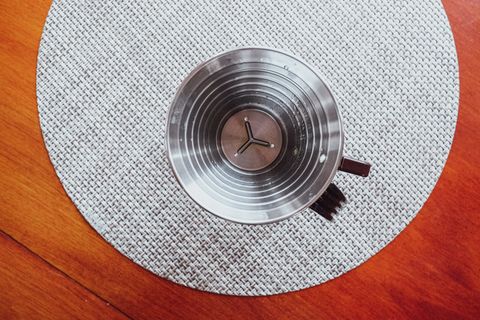
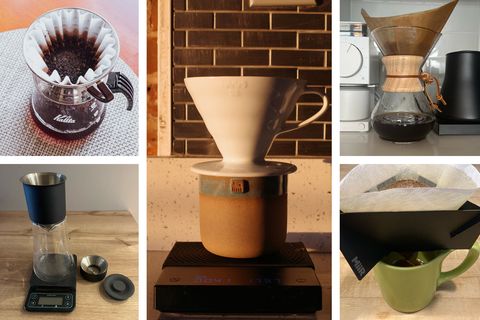

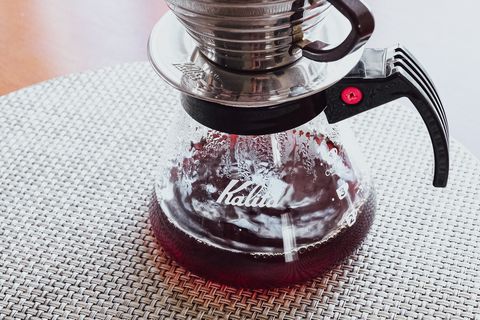

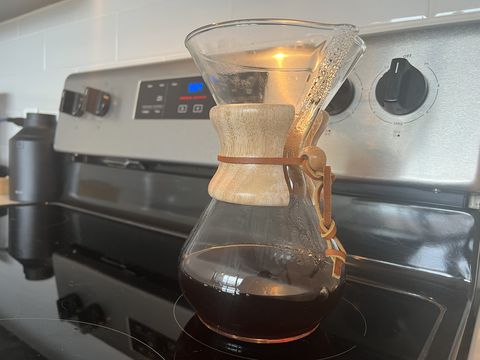

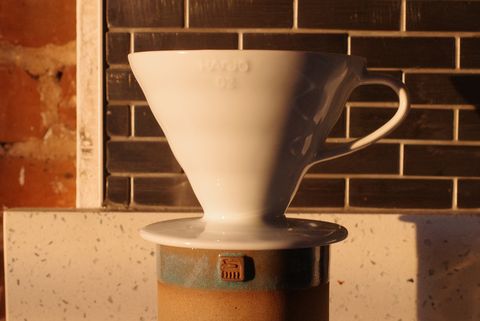

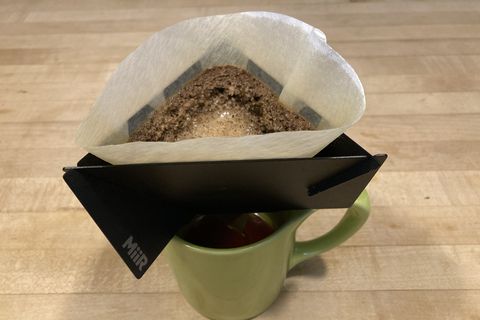
![Fellow Stagg [XF] Pour-Over Set](https://hips.hearstapps.com/vader-prod.s3.amazonaws.com/1681145788-best-pour-over-coffee-makers-embed-5-64343fb1148fa.jpg?crop=1xw:1xh;center,top&resize=480{ead4cb8c77dfcbdb67aba0af1ff8dfae0017fcc07a16fe7b51058939ac12c72a}3A{ead4cb8c77dfcbdb67aba0af1ff8dfae0017fcc07a16fe7b51058939ac12c72a}2A)
